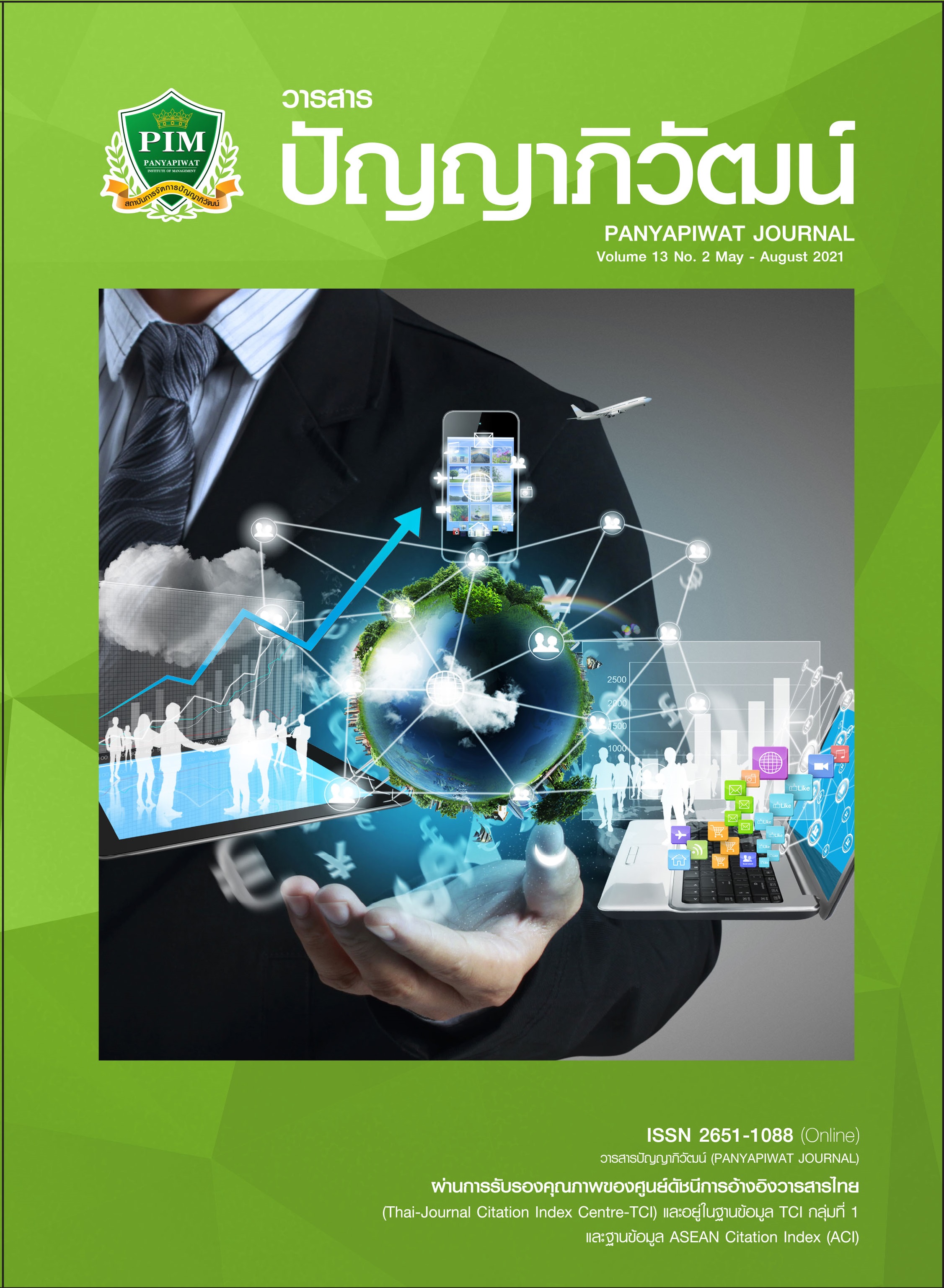DISTRIBUTING THE RESPONSIBILITIES OF LEARNING OUTCOME STANDARDS TO THE SPECIFICCOURSES ACCORDING TO THE ENTREPRENEURS’ PERSPECTIVES OF CERTIFIED ACCOUNTING PRACTICE: A CASE STUDY OF BACHELOR’S DEGREE OF TECHNOLOGY IN ACCOUNTING PROGRAM (THE 2020 RE-MODIFIED VERSION) INSTITUTE OF VOCATIONAL EDUCATION NORTHERN (REGION 2) OFFICE OF VOCATIONAL EDUCATION COMMISSION
Main Article Content
Abstract
The major purposes of this study were to investigate the undergraduate level standards of learning outcomes based on the B.E. 2560 Thai Qualifications Framework for Higher Education (TQF: H. Ed), and to identify both major and minor responsibilities in preparation of curriculum mapping in the specific course component. The research sample consisted of 146 personnel working in 146 certified accounting offices throughout the country. The employed research tool was a questionnaire that was developed according to the specifications determined by the B.E. 2560 Thai Qualifications Framework for Higher Education (TQF: H. Ed) which comprised six aspects.
The research findings revealed that, based on the respondents’ perspectives in order to determine the major responsibilities in preparation of curriculum mapping, the items could be ranked based on rating means of the highest to high levels from top to bottom as follows: (1) being able to communicate with various groups of people; (2) having knowledge and understanding of important theoretical and practical principles; (3) being self-disciplined and punctual; (4) having computer skills applicable for working purposes; (5) having good commands in implementing basic electronic and technological devices; (6) having good critical thinking skills; (7) being able to apply modern information technology and communications skills; (8) being able to perform actual work in in real-time workplaces; (9) having good academic and professional code of ethics; (10) having good virtues, morality, public-mindedness and honesty; and (11) having creative problem-solving skills on personal and public situations. On the other hand, the respondents’ perspectives on the minor responsibilities in preparation of curriculum mapping could be ranked based on rating means of the moderate level from top to bottom as follows: (1) having knowledge of the methods of using technological devices; (2) being able to retrieve and seek technological information; (3) being able to integrate learning with working performances; (4) being able to apply knowledge and skills in one’s field of study for problem solving in real-time work performance; (5) being able to think, analyze and solve technological problems systematically; (6) being able to apply calculating and technological devices for technology-related career developments; and (7) recognizing one’s own roles and duty and having responsibility in work performance.
Article Details
I and co-author(s) certify that articles of this proposal had not yet been published and is not in the process of publication in journals or other published sources. I and co-author accept the rules of the manuscript consideration. Both agree that the editors have the right to consider and make recommendations to the appropriate source. With this rights offering articles that have been published to Panyapiwat Institute of Management. If there is a claim of copyright infringement on the part of the text or graphics that appear in the article. I and co-author(s) agree on sole responsibility.
References
Bureau of Vocational Education Standards and Qualification. (2017). A Workshop on the Re-Modified Curriculum Syllabus of Bachelor’s Degree of Technology in the 2016 - 2017 Academic Year. Bangkok: Bureau of Personnel Competency Development. [in Thai]
Henchokchaichana, N. & Srijanphet, S. (2016). Auditing. Bangkok: TPNpress Limited Partnership. [in Thai]
Jinsiriwanich, J. (2019, November 13). Interview. Managing Director. THAI CPA CO., LTD. [in Thai]
Institute of Vocational Education Central Region 5 and Bureau of Vocational Education Standards and Qualification. (2017). A Program Committee Meeting on the Examination and Evaluation of B.E. 2013 Curriculum of Bachelor of Technology (B.E. 2018 Modified Version). Bangkok: Bureau of Personnel Competency Development. [in Thai]
Institute of Vocational Education Northern Region 2. (2020). Bachelor’s Degree of Technology in Accounting Program (Continuing) Adjusted 2020. Bangkok: Vocational Education Commission, Ministry of Education. [in Thai]
Office of the Civil Service Commission. (2018). Comprehension Skills and Digital Technological Application. Retrieved December 15, 2019, from https://www.ocsc.go.th/DLProject/mean-dlp [in Thai]
Office of the Higher Education Commission. (2016). A Workshop on the Development of Teachers and Educational Staff Organizing the Curriculum of the Bachelor’s Degree of Technology Based on the Standards of B.E. 2015 Bachelor’s Degree. Bangkok: Bangkok Palace Hotel. [in Thai]
Office of the Higher Education Commission. (2018). Learning Outcome Standards. Retrieved September 15, 2019, from http://www.mua.go.th/users/bhes/Bhes4/KM_Group/KMBse57/detail/KM2.pdf [in Thai]
Marasri, S. (2019). Developing Critical Thinking Skill in the 21st Century. The Journal of MCUnan Review, 3(2), 105-122. [in Thai]
Thai Qualifications Framework for Higher Education. (2018). Retrieved September 4, 2018, from http://www.stou.ac.th/offices/rdec/yala/main/%E0 B8%99%E0%B8%B1%E0B8%081%E0%B8%A8%E0%B8%B6%E0%B8%81%E0%B8%A9%%B2/%E0%B8%81%E0%B8%A3%E0%B8%AD%E0%B8%9A%E0%B8%81%E0%B8%B2%E0%B8%A3%E0%B9%80%E0%B8%A3%E0%B8%B5%E0%B8%A2%E0%B8%99%E0%B8%A3%E0%B8%B9%E0%B9%89%205%20%E0%B8%94%E0%B9%89%E0%B8%B2%E0%B8%99.docx


